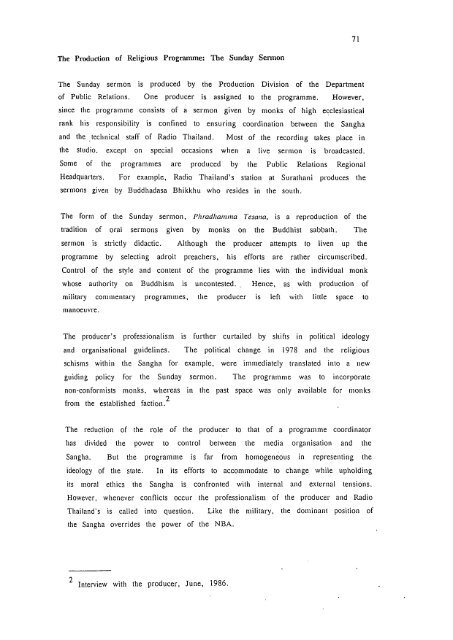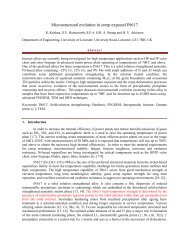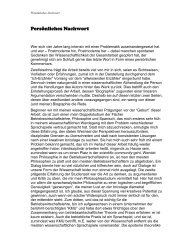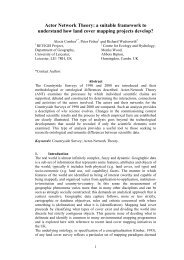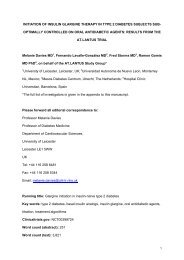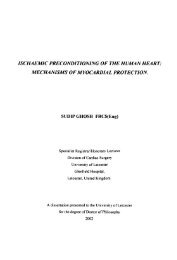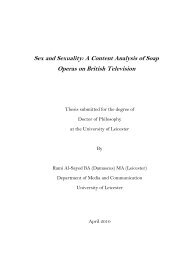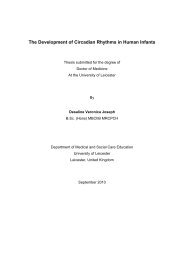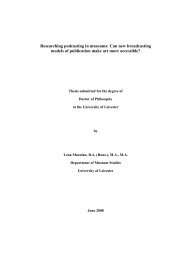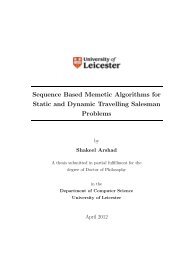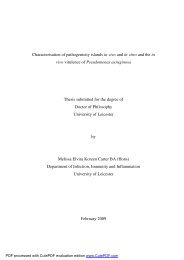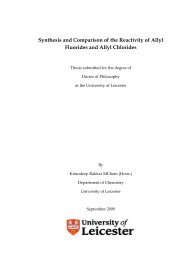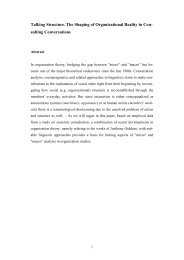iieiiei1eWrkers - Leicester Research Archive - University of Leicester
iieiiei1eWrkers - Leicester Research Archive - University of Leicester
iieiiei1eWrkers - Leicester Research Archive - University of Leicester
Create successful ePaper yourself
Turn your PDF publications into a flip-book with our unique Google optimized e-Paper software.
The Production <strong>of</strong> Religious Programme: The Sunday Sennon<br />
The Sunday sermon is produced by the Production Division <strong>of</strong> the Department<br />
<strong>of</strong> Public Relations. One producer is assigned to the programme. However,<br />
since the programme consists <strong>of</strong> a sermon given by monks <strong>of</strong> high ecclesiastical<br />
rank his responsibility is confined to ensuring coordination between the Sangha<br />
and the technical staff <strong>of</strong> Radio Thailand. Most <strong>of</strong> the recording takes place in<br />
the studio, except on special occasions when a live sermon is broadcasted.<br />
Some <strong>of</strong> the programmes are produced by the Public Relations Regional<br />
Headquarters. For example, Radio Thailand's station at Surathani produces the<br />
sermons given by Buddhadasa Bhikkhu who resides in the south.<br />
The form <strong>of</strong> the Sunday sermon, Phrad/zainnza Tesana, is a reproduction <strong>of</strong> the<br />
tradition <strong>of</strong> oral sermons given by monks on the Buddhist sabbath. The<br />
sermon is strictly didactic. Although the producer attempts to liven up the<br />
programme by selecting adroit preachers, his efforts are rather circumscribed.<br />
Control <strong>of</strong> the style and content <strong>of</strong> the programme lies with the individual monk<br />
whose authority on Buddhism is uncontested. Hence, as with production <strong>of</strong><br />
military commentary programmes, the producer is left with little space to<br />
manoeuvre.<br />
The producer's pr<strong>of</strong>essionalism is further curtailed by shifts in political ideology<br />
and organisational guidelines. The political change in 1978 and the religious<br />
schisms within the Sangha for example, were immediately translated into a new<br />
guiding policy for the Sunday sermon. The programme was to incorporate<br />
non-conformists monks, whereas in the past space was only available for monks<br />
from the established faction.2<br />
The reduction <strong>of</strong> the role <strong>of</strong> the producer to that <strong>of</strong> a programme coordinator<br />
has divided the power to control between the media organisation and the<br />
Sangha. But the programme is far from homogeneous in representing the<br />
ideology <strong>of</strong> the state. In its efforts to accommodate to change while upholding<br />
its moral ethics the Sangha is confronted with internal and external tensions.<br />
However, whenever conflicts occur the pr<strong>of</strong>essionalism <strong>of</strong> the producer and Radio<br />
Thailand's is called into question. Like the military, the dominant position <strong>of</strong><br />
the Sangha overrides the power <strong>of</strong> the NBA.<br />
2 Interview with the producer, June, 1986.<br />
71


